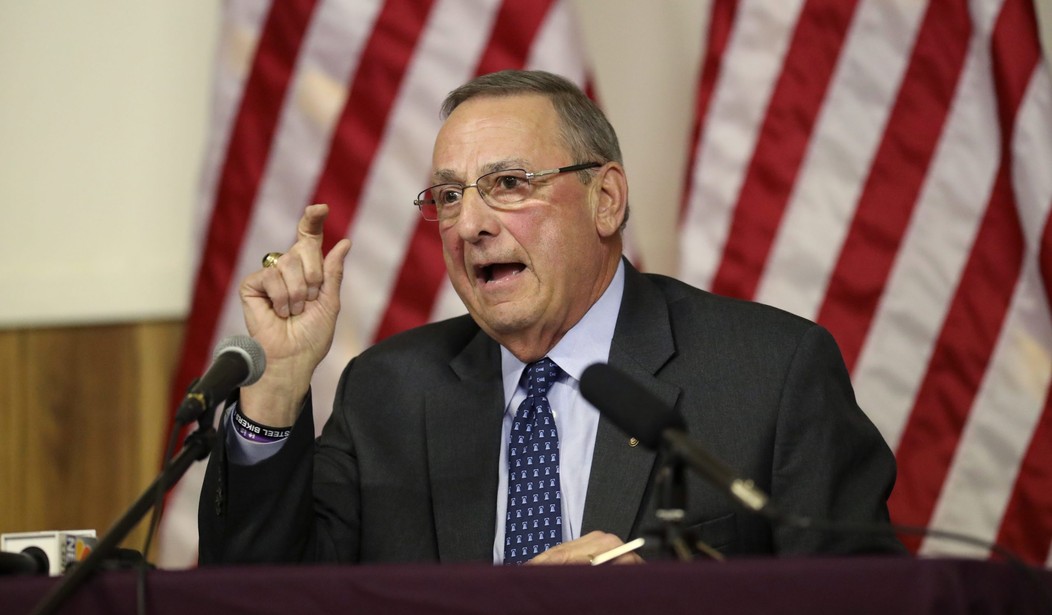Ranked-choice voting has rankled the politicos of Maine. The state’s Senate is hoping the highest court in the Pine Tree State will concur and undo what the voters have done.
Republican Gov. Paul LePage has added two more voter-approved referendums to the list of bad decisions he wants to be changed.
LePage called on the legislature to take a look at how it can reform the referendum process to bring politicians back into control.
By approved the ranked-choice voting initiative, Maine voters in November changed an election system that had seemed so simple. The winner takes office. Second place is just first place in a long line of losers who all go home.
What could be easier?
Maybe the better question is, “What could be more democratic?”
Here’s an example of what rankled voters: LePage came out on top in a three-candidate election in 2010, but he had less than 38 percent of the vote. He won re-election four years, later but again managed to capture less than 50 percent of the vote.
Well, as PJM reported, Maine voters figured out a way in November to fix that by approving the Ranked Choice Voting referendum.
As a result, in the next statewide election, if there are more than two candidates on the ballot, Maine voters will cast a ballot for their first choice, their second choice, their third choice, and so on. If one candidate gets more than 50 percent of the vote, he or she wins.
But if the top candidate does not have a majority of the vote, it gets a little tricky, as the Ranked Choice Voting website explained:
“If one candidate receives an outright majority, he or she wins. If no candidate receives a majority, the candidate with the fewest first choices is eliminated and voters who liked that candidate the best have their ballots instantly counted for their second choice. This process repeats and last-place candidates lose until one candidate reaches a majority and wins. Your vote counts for your second choice only if your first choice has been eliminated.”
The Portland Press Herald editorial board wrote that was preferable to the current system in which “loud voices are noticed and the ability to bring people together undervalued.”
The Maine Senate, by a vote of 24-10, disagreed and asked the Maine Supreme Court for a ruling.
Senate President Mike Thibodeau (R) said he was afraid the RCV system was unconstitutional, and that the “last thing in the world we should do is turn our back on our responsibility to correct this conflict between the statute that was passed and Maine’s constitution.”
“Because the next election – and God forbid it’s any one of your elections that you’re in – could be turned upside down and we could leave our state in turmoil trying to figure out exactly who the winner of that election is,” Thibodeau told the Portland Press Herald.
The incumbent dismay over Ranked Choice Voting is not a partisan issue.
Democratic Sen. Geoffrey Gatwick said even though he supports ranked-choice voting, he thinks the Supreme Court should weigh in on this.
“I have strong feelings. I hope they resolve it in one particular way, in which case I’ll be pleased,” said Gatwick.
But that doesn’t mean he wants ranked-choice voting to be nothing more than another quirky political footnote in the history of Maine.
“If, on the other hand, they resolve it in the other way, I think we always have the option before us of amending the constitution,” Gatwick said.
LePage, who as we noted has a history of winning office with less than a plurality of the popular vote, wasn’t happy about the voters’ approval of ranked-choice voting either. But he was also upset by what voters did with two other referendums and the fact there were so many referendums on the ballot.
LePage took time in his State of the State Address to blast the voters for approving two referendums. One of the ballot propositions raised taxes on the people who are at the top of the wage scale in Maine. The other would increase Maine’s minimum wage to $12 by 2020.
He said it was obvious that voters didn’t know what they were voting for. They should have been asked, LePage said, if they wanted to see the price of everything go up in return for an increase in the minimum wage.
“Make no mistake, this minimum wage has nothing to do with economics, it has everything to do with socialist ideology,” he said.
LePage said it was up to the Maine Legislature to blunt the impact of what their constituents had done.
“We need to reform the referendum process and we need to return to a representative government,” LePage said.
Sen. Thibodeau agreed with LePage that the Legislature knows best.
“The fact of the matter is, most of these things have been discussed in the Legislature and the Legislature didn’t see the value in passing different bills that ended up in a referendum process,” Thibodeau said.
GOP Sen. Garrett Mason was much blunter during a Maine Public Radio interview. He said outside groups were coming into Maine and buying the elections.
More than $10 million was spent on the five November 2016 ballot initiatives. More than half of the money came from Micheal Bloomberg’s Everytown for Gun Safety Group to back a ballot measure, which lost, to tighten background checks on gun sales.
“I hate to say it, but it’s happened way too many times recently,” Mason said.
Thibodeau also said those outside groups could focus on the two most populous counties in Maine and forget about the rest of the state.
“And right now we have a referendum process that allows people to simply go to our two most populous counties, York and Cumberland, and go to the local Walmart and collect the signatures they need to be on the ballot,” Thibodeau said. “I think the rest of the state feels they want their voice heard in this process too.”
Rep. Lance Harvell (R) has proposed legislation to correct that. His proposal would mandate that ballot campaigns be required to collect petition signatures from each of the 35 state senate districts.
“The thought is that we need to make it a little more difficult to get things on the ballot, or not so much difficult but that you would have buy-in from all sections of the state on some kind of equal process,” Harvell told Maine Public Radio.
Justine Sarver, director of the Ballot Initiative Strategy Center that helps liberal and progressive campaigns, said she has seen and heard this all before.
Sarver argued that Maine Republicans were just trying to quiet progressive voices who have no choice but to go the referendum route.
“It is, in these times especially, an important tool, both for protest and for policymaking in the progressive realm,” she said. And to do anything else would be “simply lawlessness.”









Join the conversation as a VIP Member